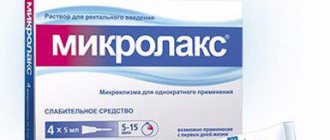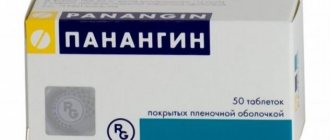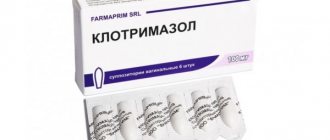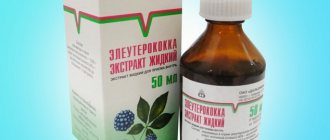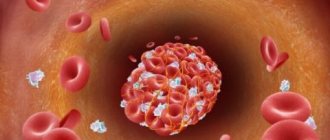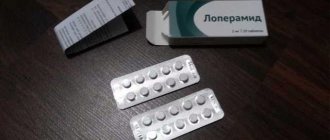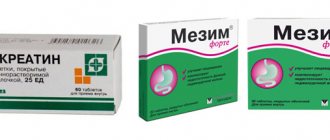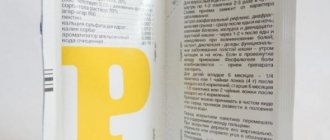Today the problem of having healthy children is very relevant. A number of external and internal factors adversely affect the development of the unborn baby and the condition of his mother. Modern pharmaceuticals offer drugs that help to safely carry a child to term. One of them is Ascorutin. What kind of medicine is this, how does it work and should it be used during pregnancy?
- 2 Why and in what trimester can a doctor prescribe Ascorutin
- 3 Contraindications, possible side effects for mother and child
- 4 Duration and frequency of use
4.1 Drug interactions
- 5.1 Tablets and gels that strengthen blood vessels in pregnant women - table
Composition of the drug
The active ingredients of the drug Ascorutin are 50 milligrams of ascorbic acid and rutin.
The drug also contains sucrose, starch, calcium stearate and talc. Ascorbic acid is a water-soluble vitamin involved in many processes. This chemical compound stimulates the synthesis of interferon, due to which an increase in immunity is observed. Vitamin C forms collagen, which helps maintain the normal condition of mucous membranes and skin. The substance is a participant in endocrine metabolism; it stimulates the synthesis of catecholamines and glucocorticosteroids - adrenal hormones.
Vitamin C also reduces the amount of “harmful” low-density lipids involved in the formation of atherosclerotic plaques and stimulates bile formation. The chemical compound is one of the natural antioxidants that neutralizes radicals that damage tissue. Ascorbic acid improves the absorption of iron from the gastrointestinal tract, which reduces the likelihood of anemia.
Attention! When carrying a child, Ascorutin can be used only according to indications after being prescribed by a doctor; self-treatment is strictly prohibited.
Rutin increases the intensity of the thrombus formation process and reduces the permeability of small vessels. Vitamin P inhibits inflammation and stimulates the immune system. This substance has antioxidant activity, it protects the cells of the human body from damage.
Thus, the use of Ascorutin during pregnancy has an immunostimulating, vascular-strengthening, antioxidant effect.
The drug is also able to prevent the development of bleeding.
How to use
The active substances included in Ascorutin tablets are quickly absorbed from the gastrointestinal tract into the blood and distributed throughout the body.
Their excess and half-life products are excreted in urine and bile. The tablets should be taken after meals and washed down with plenty of clean drinking water. It is not recommended to drink Ascorutin with carbonated water, since the alkali it contains reduces the absorption of vitamin C by the body.
Take Ascorutin with caution in case of diabetes mellitus and kidney disease, and in case of thrombophlebitis and urolithiasis it is contraindicated
Attention! Noticed an error in the text?
Select it with the mouse and press “Ctrl+Enter”
Release form and expiration date
Ascorutin for pregnant women has one release form - tablets. They are sold in polymer jars of 30 or 50 pieces, or in packaging with 10 cells of 1 or 5 plates. The tablets themselves have a light yellow-green tint and may have inclusions on them.
The instructions say that the shelf life of the medicine is 3 years. The use of Ascorutin after this period of time is strictly prohibited. The drug should be stored in a dark, dry place, avoiding direct sunlight, away from children.
Indications for use of the drug
Ascorutin during pregnancy is used for the following symptoms and diseases:
- Anemia. The drug improves the absorption of iron, necessary for the synthesis of hemoglobin.
- Rheumatic lesions of blood vessels and other organs. Ascorutin has an anti-inflammatory effect.
- Preeclampsia. The drug reduces capillary permeability, which leads to a reduction in edema.
- Bacterial and viral infections. The medication stimulates the immune system, which increases the body's resistance to the expectant mother.
- Varicose veins of the lower extremities. Ascorutin strengthens blood vessels and prevents their fragility in this disease.
- Placental abruption. The drug strengthens the blood vessels of this organ, prevents rupture of arteries and veins. Prevention of bleeding during childbirth. The drug helps in restoring damaged vascular walls.
- Haemorrhoids. The medication strengthens hemorrhoidal veins and helps relieve blood stagnation in them.
- Antioxidant therapy.
- Signs of hypovitaminosis of vitamin C and P. These include general weakness, pain throughout the body, bleeding gums, swelling, hemorrhages (bleeding in the skin).
Ascorutin's appointment
Why is this drug needed at all, and what does it consist of? It is a combination of various chemical structures that form an integral vitamin complex. Its main components are ascorbic acid and rutin. They both belong to vitamin group C. During pregnancy, Ascorutin is often prescribed before childbirth to improve their immunity and eliminate vitamin deficiency, since the expectant mother cannot always get all the beneficial microelements and vitamins she and her baby need in the usual way through food. It is also often prescribed by doctors when a pregnant woman falls ill with a viral disease, or when an infection has entered the body.
Antibiotics are generally prohibited for girls in an interesting situation and are allowed only in extreme cases, so doctors tell pregnant women to take ascorutin to fight a cold. Its beneficial properties also lie in the fact that it removes all signs of intoxication in the body that occur in pregnant women during illness. This is a very important point, because all the toxins and toxic substances, gradually accumulating, harm not only your internal organs, but also the development of your baby. If the matter is not intervened in time, the child may be born with serious abnormalities or pathologies. The drug combats lacrimation well and eliminates nasal congestion.
Among other positive aspects that can be highlighted in the specialization of this drug is the prevention of fragility of blood vessels and capillaries, which very often manifests itself in the form of everyone’s favorite varicose veins. As an additional effect, it removes any swelling and inflammation that is associated with it. Ascorutin, among other positive aspects, can also help eliminate severe bleeding, hemorrhoids and has a wide range of actions as an antioxidant. As you can see for yourself, this product has a lot of advantages, but let’s figure out whether it’s possible to drink ascorutin for a short period of time.
Effect of the drug on the fetus
In the early stages of pregnancy, Ascorutin is absorbed into the systemic bloodstream and enters the body of the unborn child. This process can lead to disruption of intrauterine development, since at the moment all fetal systems are being formed.
At the present stage of medicine, the teratogenic (causing developmental anomalies, deformities) effect of the drug in the 1st trimester of pregnancy has not been proven, but the possibility of its harmful effect on the embryo cannot be ruled out.
Use of the drug in later stages of pregnancy does not cause negative effects on the fetus. This is due to the fact that from the second trimester of gestation, the placenta begins to fully perform its functions and protect the child from harmful substances. Also at this stage of intrauterine development, the main organs and tissues of the fetus are formed.
Patient reviews
Maria, Taganrog “An excellent drug, I was convinced of this in my own practice. There were, of course, doubts about taking it during pregnancy, but after trusting my specialist, I didn’t regret it later. I took 2 tablets for a month, as I suffered from severe late toxicosis. From the first days of treatment, negative symptoms decreased significantly. Fortunately, this did not affect my health or the health of the baby.”
Elena, Belgorod “When I read the name of the Ascorutin tablets in my prescription, I was slightly perplexed, because I know that this medicine is not prescribed during pregnancy. After a long conversation with the attending physician, she finally agreed with him and purchased the drug at the pharmacy. Throughout the entire treatment I felt great, I didn’t have any headaches or any other symptoms that scared other moms on the forum. This incident taught me to listen to my doctor, and not to dubious responses on the Internet.”
Evgeniya, Ufa “I had a very difficult time with my third pregnancy, severe fetal hypoxia developed several times, and the child was barely saved. During this period I had to meet Askorutin. I can only say good things about the product. The medicine is inexpensive, the tablets are packaged in jars, and are always convenient to carry with you. She carried the baby to term and gave birth without any problems. Thanks to my doctor and Askorutin.”
Instructions for use
It is strictly forbidden to take Ascorutin in the first trimester of pregnancy. The dosage of the drug at later stages is selected by a specialist and depends on the disease and condition of the expectant mother. Typically, experts prescribe 1 tablet 2-3 times a day.
The medicine should be used immediately after meals, it is recommended to drink it with cool, clean water without carbon. The course of treatment with the drug is about a month, in severe cases it can be extended.
Ascorutin before childbirth can be used as a means of preventing bleeding for certain indications. In this case, doctors recommend starting to take the drug at 37-38 weeks of pregnancy. The course of treatment is 3 weeks or until labor begins.
special instructions
When taking tablets with an alkaline drink, their effect is reduced.
Diseases of the digestive system reduce the rate of absorption of the drug.
During therapy, there is an increase in iron absorption, so the medication is prescribed with caution for thalassemia, hemochromatosis, leukemia and some other pathologies.
Throughout treatment, it is necessary to monitor the functioning of the kidneys, the condition of urine and blood.
It is recommended to take the tablets in the first half of the day, as their components have a mild stimulating effect.
Contraindications
Despite the fact that the drug is a vitamin complex, it has strict contraindications for use. Ascorutin is prohibited for use in persons:
- with pregnancy up to 12 weeks inclusive;
- having an increased risk of thrombosis;
- with diabetes mellitus;
- having chronic renal failure;
- with urolithiasis;
- having allergic reactions to the components of the drug;
- with persistent high arterial hypertension;
- taking vitamin C supplements.
Analogs
Analogues of the components of the drug "Ascorutin":
- Askorutin D
- Askorutin-UBF
- Profilaktin S
Analogues of the action of the drug "Ascorutin":
- Anavenol
- Angiovitis
- Venarus
- Herbion escalus
- Ginkor fort
- Detralex
- Pilex gem
- Procto-Glyvenol
- Cyclo 3 fort
- Aescusan
If Ascorutin is contraindicated for some reason or causes side effects, the doctor is obliged to select safe analogues for it.
Analogues are drugs with the same composition or similar principle of action.
Ascorutin's analogues are:
- Immunovit C;
- Anavenol;
- Phlebodia 600 and Phlebopha;
- Detralex;
- Venarus;
- Diosmin.
Side effects
Usually, taking Ascorutin according to the instructions does not cause side effects. Sometimes the drug provokes the development of allergic reactions, most often in the form of a rash on the skin, less often in the form of edema and vasospasm. Less commonly, the drug increases blood pressure and body temperature.
Ascorutin may cause a decrease in kidney function, and the drug also stimulates the formation of stones in them. Quite rarely, the drug causes dyspepsia: nausea, vomiting, heartburn, belching, diarrhea, diarrhea, abdominal pain.
The drug has virtually no effect on the central nervous system, but sometimes it can reduce concentration, cause headaches, sleep disorders, and performance. A very small number of patients noted worsening mood, tearfulness, irritability and aggression during the course of Ascorutin therapy.
The drug increases the risk of thrombosis in individuals with a predisposition to this pathology. Therefore, before taking it, it is necessary to donate blood for a general analysis. In the initial presence of a high platelet count, the use of the drug can cause microinfarctions of organs, including the placenta, which will lead to its premature detachment.
What young mothers say about the use of Ascorutin during the gestational period
If you carefully study the forums of young mothers, you will notice that Ascorutin is a fairly common medication during pregnancy. And even despite the prohibitions prescribed in the instructions, this drug is quite often prescribed by the attending physician in the first trimester of gestation. In general, women have a positive attitude towards drug therapy and prevention with Ascorutin. You may notice that it is taken both as an independent drug and, most often, in complex therapy with other drugs. Only a few women report side effects, which manifest themselves in the form of urticaria, as well as itching and burning of the skin.
Although Ascorutin is considered by many as a vitamin supplement, it is strictly contraindicated to use it independently during gestation. An excess of vitamins in the body can cause even more serious consequences than their lack.
